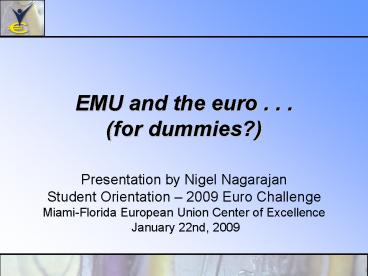EMU and the euro ' ' ' for dummies - PowerPoint PPT Presentation
1 / 20
Title:
EMU and the euro ' ' ' for dummies
Description:
Countries need to use fiscal stimulus, just as in US ... European Economic Recovery Plan governments enact fiscal stimulus packages ... – PowerPoint PPT presentation
Number of Views:40
Avg rating:3.0/5.0
Title: EMU and the euro ' ' ' for dummies
1
EMU and the euro . . . (for dummies?)
- Presentation by Nigel Nagarajan
- Student Orientation 2009 Euro Challenge
- Miami-Florida European Union Center of Excellence
- January 22nd, 2009
2
What are we going to cover today?
- What is EMU?
- What are the costs and benefits of having a
single currency? - What economic benefits derive from the single
market? - How is economic policy made in a monetary union?
- Will EMU break up?
3
What EMU isnt
- Sorry to disappoint you, but . . .
. . . EMU is not a bird!
4
What does EMU stand for?
- Does EMU stand for
- European Monetary Union?
- Or
- Economic and Monetary Union?
5
EMU vs. the euro area
- EMU is a Treaty objective shared by all 27 EU
Member States - The euro is a reality for 16 Member States (the
euro area) - What about the E in EMU?
6
What are the three parts of EMU?
7
Which countries are in the euro area?
- Euro area Austria, Belgium, Cyprus, Finland,
France, Germany, Greece, Ireland, Italy,
Luxembourg, Malta, Netherlands, Portugal,
Slovakia, Slovenia, Spain. - EU Member States obliged to adopt the euro
eventually Bulgaria, Czech Republic, Estonia,
Hungary, Latvia, Lithuania, Poland, Romania,
Sweden. - EU Member States with an opt out from adopting
the euro Denmark, United Kingdom.
8
How does a country join the euro?
- A Member State must fulfill the convergence
criteria laid down by the Maastricht Treaty - Low inflation
- Low interest rates
- Low government deficit
- Low government debt
- Stable exchange rate (ERM II)
9
What are the benefits of the euro? And the costs?
- CITIZENS benefit from greater price transparency,
which should stimulate competition and reduce
prices and from the elimination of currency
exchange costs - For BUSINESSES it is easier to make investment
decisions (no exchange rate risk) - The ECONOMY benefits from price stability, and
lack of exchange rate risk
Countries that adopt the euro can no longer
change their INTEREST RATE or their EXCHANGE
RATE. In a monetary union, you cannot have an
INDEPENDENT MONETARY POLICY.
10
The challenge of asymmetric shocks
(1) Federal fiscal system
(2) High labour mobility
Fiscal transfers ? Taxes ?
Real world example of a single currency area
Fiscal transfers ? Taxes ?
Euro area less good at coping with shocks?
Asymmetric shock oil prices ?. Affects Texas and
Massachusetts differently.
11
The benefits of EU membership the single market
- Larger market ? more competition
- More competition ? more choice, lower prices for
consumers - More competition ? promotes efficiency
- Larger market ? firms can exploit economies of
scale
12
The single market economies of scale
- Larger firms enjoy cost advantages over smaller
firms (e.g. purchasing, marketing) - EU firms can produce for a market of 500m
consumers - And pass on lower costs to consumers
- This should encourage economic efficiency and
stimulate economic growth
13
The euro and the single market
- The euro eliminates currency transactions costs
- Leads to greater price transparency ? price
convergence - Eliminates exchange rate uncertainty ?
stimulates investment - Euro leads to increased trade and investment
flows
One market, one money
14
Economic policy in EMU
15
Economic policy making - the euro area and the US
Monetary policy
ECB President Jean-Claude Trichet
Federal Reserve Chairman Ben S. Bernanke
Fiscal policy
Treasury Secretary Henry M. Paulson
Economic policy co-ordination more difficult?
16
EMU and the financial crisis
this is an equal-opportunities economic crisis,
and the euro area is in it just as deep as
America, Britain and the rest. The Economist,
January 15th, 2009
- US and euro area economies connected by strong
trade, investment links - European banks invested heavily in US sub-prime
mortgages - Euro area has less flexible economy than US,
with lower productivity growth less resilient? - Some euro area economies had housing bubbles
- European consumers less indebted than US
17
EMU and the financial crisis
- Crisis exposes persistent divergences in EMU
- One size fits all monetary policy problematic?
- Countries need to use fiscal stimulus, just as
in US - But difficult to coordinate fiscal response of
16 Member States - Break-up of EMU?
18
The financial crisis how should Europe respond?
ECB cuts interest rates to 2
European Economic Recovery Plan governments
enact fiscal stimulus packages
19
The financial crisis how should Europe respond?
Speed up economic reforms (Lisbon Strategy)
http//ec.europa.eu/growthandjobs/index_en.htm
Make the single market work better (especially
for Services)
20
Conclusions
- The launch of the euro was a tremendous
achievement for the EU - But EMU is still a work in progress (especially
for the E part) - How will EMU cope with its first recession?
- Will the crisis lead to the break up of EMU or
will it encourage countries to speed up reforms? - Can you have a monetary union without a complete
economic union? Political union?








![[READ DOWNLOAD] U.S. Constitution For Dummies PowerPoint PPT Presentation](https://s3.amazonaws.com/images.powershow.com/9915694.th0.jpg?_=20230803066)






















